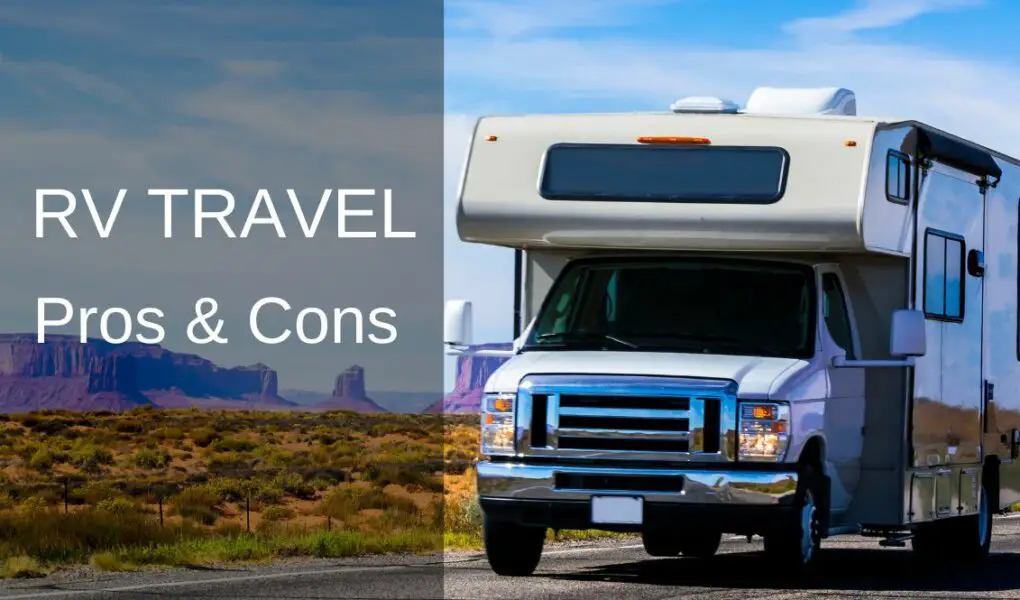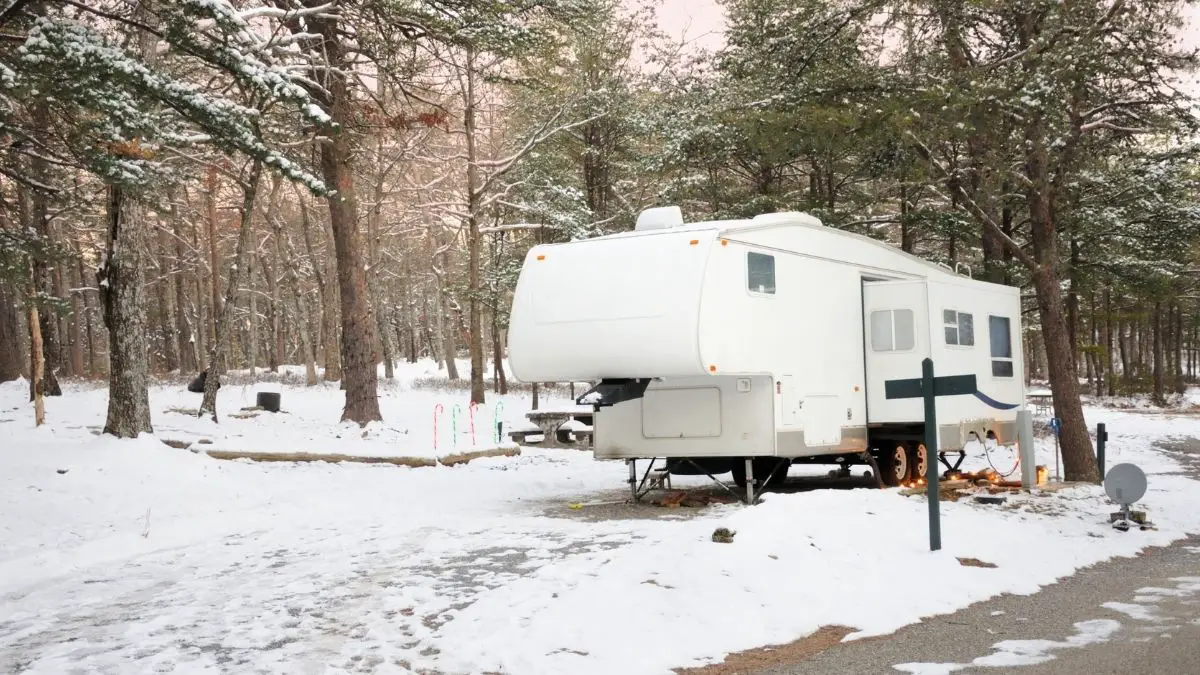The Pros And Cons Of RV Travel
RV travel is one of the most popular forms of vacationing in America, and for good reason. It’s a great way to see the country and spend quality time with family or friends. But there are pros and cons to consider before packing up your RV and hitting the open road. We’ll explore those pros and cons in depth, so you can make an informed decision about whether RV travel is right for you.
The beauty of RV travel is that it gives you the freedom to go wherever your heart desires. Whether you want to explore the highways of America or camp out in a remote location, an RV offers an unprecedented amount of flexibility that no other form of travel can match. You can stay as long as you like at each destination, without worrying about having to find a place to stay or meeting check-in times.
However, there are some drawbacks to consider when planning an RV trip. The cost of fuel can add up quickly if you’re doing a lot of driving, and finding places to park overnight may be more difficult than expected depending on where you’re going. Additionally, there’s always the risk that something could happen while out on the road – from mechanical issues to inclement weather – so it pays to be prepared for any situation.
In this article we’ll delve into all these factors in more detail so that you can make an informed decision about whether RV travel is right for you!
What Is Recreational Vehicle Travel?
Recreational Vehicle (RV) travel is an increasingly popular way to explore the country. It involves taking a large trailer or motorhome and using it as your home on wheels. With an RV, you can take your living space with you wherever you go, allowing for unprecedented freedom to explore the open road. But is RVing right for everyone? Let’s take a closer look at the pros and cons of recreational vehicle travel.
One major advantage to RVing is the convenience it offers. Rather than having to hunt down hotels or campgrounds along your route, you can just pull over wherever you want whenever you need a break from driving. You also don’t have to worry about packing and unpacking every time you move locations — just hitch up your trailer and drive away! Additionally, an RV provides all the comforts of home, from kitchen appliances to entertainment options like TVs and sound systems.
On the other hand, there are some drawbacks associated with RV travel as well. For one thing, RVs require a lot of upkeep — from regular oil changes to frequent maintenance for parts like brakes and tires. Additionally, fuel costs can quickly add up since most RVs are not known for their fuel efficiency. And depending on where you’re going, parking spaces may be hard to come by in cities or towns that don’t have designated spots for larger vehicles like trailers and motorhomes.
All things considered, recreational vehicle travel has its benefits and drawbacks — it’s important to weigh both before making any decisions about hitting the road in an RV!
Benefits Of Rv Vacations
RV vacations offer a unique set of benefits that make them an attractive option for travelers looking for adventure. Here are just a few reasons to consider hitting the road in an RV:
Cost Savings: One of the biggest advantages of RV travel is that it’s often more affordable than your traditional vacation. Because you don’t have to book hotels or pay for meals out, you can save money on lodging and food costs. Additionally, many campgrounds offer discounts for weekly stays, making it even easier to keep your vacation budget low.
Flexibility: With an RV, you’re not tied down to one location — you can go wherever you want, whenever you want. You also don’t have to worry about finding places along the way since your home is with you on the road. This makes it easy to adjust plans as needed and explore new routes without the hassle of booking flights or trains.
Comfort: When you travel with an RV, all the comforts of home come along with you. Whether it’s cooking up meals in your kitchen or lounging in front of the TV after a long day of driving, there are plenty of ways to relax and unwind during your trip.
No matter what kind of traveler you are, RV vacations can provide an exciting and budget-friendly way to explore different parts of the country. From cost savings to comfort and flexibility, there are plenty of great reasons to hit the open road!
Disadvantages Of Rv Trips
Despite the benefits of RV vacations, there are also some potential drawbacks to consider before you hit the road. Here are a few potential downsides to RV travel:
Maintenance and Upkeep: Though RVs can provide great value for travelers, they also require regular maintenance and upkeep to ensure that they remain in good working condition while on the road. This means oil changes, tire rotations, and other services that can be costly over time. Additionally, if something breaks down or needs repairs while on the trip, it can add extra time and expense to your journey.
Space Limitations: While an RV offers plenty of room for day-to-day activities inside its walls, it can be cramped when multiple people are living in it at once. If you’re traveling in a group or with family members, this may mean having to share small spaces or sacrifice some privacy.
Time Commitment: Depending on where you’re going and how long your trip is, planning an RV vacation may involve more preparation than other types of trips. This could include mapping out routes ahead of time, researching campgrounds along the way, and learning about any restrictions or fees associated with certain areas. As well as it takes longer to travel in an RV than a car of the same distance.
These factors should all be taken into consideration before embarking on an RV adventure. By being aware of both the pros and cons associated with these types of trips, you’ll be better equipped to make an informed decision about whether or not an RV vacation is right for you.
Financial Considerations
When it comes to RV travel, financial considerations should always be taken into account. Although an RV vacation can be a great way to explore and experience the world, it also requires a certain level of spending. Here are some things to consider when budgeting for your trip:
Fuel Costs: Depending on the size of your RV and the length of your journey, fuel costs can quickly add up. Be sure to factor in how much fuel you’ll need for each leg of the trip and plan accordingly. Additionally, keep in mind that fuel prices tend to vary from state to state, so you may want to look for ways to save money on fuel if possible.
Campground Fees: When traveling by RV, campgrounds are often necessary for rest stops or overnight stays. The cost of these campsites can vary greatly depending on location and amenities offered, so it’s important to do research ahead of time and find out what you’ll need to budget for them.
Miscellaneous Expenses: There are many other expenses associated with RV travel that should be taken into consideration as well. This could include food costs while on the road, entertainment expenses, vehicle maintenance costs, and any additional fees that may come up along the way.
In order to get the most out of your vacation without breaking the bank, it’s important to plan ahead and have an accurate estimate of all potential expenses before hitting the road. By doing this, you can ensure that you’re prepared financially for whatever surprises may arise during your trip!
Selecting The Right Vehicle
When planning an RV vacation, selecting the right vehicle is key. Choosing the wrong RV can mean uncomfortable sleeping arrangements, lack of storage space, and other issues that could put a damper on your trip. Here are some tips to help you make the right decision:
Size Matters: The size of the RV you choose should be based on how many people will be traveling in it. If you’re planning a family vacation, you’ll want to make sure there’s plenty of space for everyone to sleep comfortably. Conversely, if it’s just you or a couple of people traveling together, you may opt for a smaller RV that won’t take up as much room on the road.
Think About Amenities: Different RVs come equipped with different amenities, so it’s important to think about what kind of features you need during your trip. Do you require a full kitchen? Does the vehicle need its own bathroom? Make sure to take all these things into account when making your selection.
Research Your Options: It’s also a good idea to research your options before committing to any one vehicle. Look into reviews from previous customers and compare prices between different companies. This way, you can ensure that you get the best deal possible and don’t end up paying too much for something that doesn’t meet your needs.
Planning Long-Distance Journeys
Once you’ve selected the ideal RV for your trip, it’s time to start planning your journey. Long-distance trips require careful planning, especially if you’re going cross-country or traveling in unfamiliar territory. Here are some tips to get you started:
Know What You’re Getting Into: Before embarking on a long-distance journey, make sure you know what you’re getting into. Research the route ahead of time, so that you know where the roads are safe and where there might be construction or other issues. And if possible, try to plan out places to stay along the way so that you don’t end up stranded with no place to sleep.
Bring Supplies: When packing for a long-distance trip, make sure to bring plenty of supplies. This includes food and drinks, as well as any medications or first aid items you may need in case of an emergency. Additionally, bring extra clothing and blankets in case of cold weather or unexpected rainstorms.
Be Prepared for Unexpected Events: Even with careful planning, there is always the chance that something unexpected will happen during your trip. Make sure your vehicle is serviced regularly and check it for any mechanical issues before leaving home. Also, keep a list of emergency contacts handy in case anything does come up during your journey. By taking these precautions beforehand, you can ensure that your RV vacation goes off without a hitch.
Safety Tips For Caravanners
With the right preparation and precautions, RV travel can be a great way to explore the country. As with any kind of travel, however, there are certain safety considerations to keep in mind. Here are some tips to help ensure your RV journey is a safe one:
Keep Your Vehicle Maintained: The most important factor in staying safe while traveling in an RV is to make sure it’s properly maintained. Check all of your vehicle’s systems before leaving home, and make sure you have plenty of fuel for the journey. If you plan on doing any off-roading or driving on dirt roads, make sure that your vehicle is up for the task.
Be Aware of Your Surroundings: When driving an RV, it’s important to pay attention to your surroundings at all times. Monitor other drivers and look out for hazards like potholes and debris in the road. Also be aware of changing weather conditions and take extra care if visibility is poor or there is ice or snow on the ground.
Stay Alert: When on the road in an RV, fatigue can set in quickly due to long hours behind the wheel. Make sure you get plenty of rest before embarking on long trips and allow yourself regular breaks along the way. Additionally, don’t drive when under the influence of drugs or alcohol; even small amounts can impair judgment and reaction time behind the wheel. With these simple precautions taken, you can enjoy a safe and memorable RV experience!
Room And Comfort Level
Maneuvering an RV can be a challenge and comfort also needs to be taken into account. While these vehicles can provide a great experience, there are some potential drawbacks that should be considered before taking the plunge.
When it comes to space, RVs can offer plenty of room for passengers and storage. Depending on the size of the RV, you may have room for a dining area, living space, bathroom and bedroom. But if you don’t choose the right vehicle for your needs, you may find yourself cramped in a smaller model. If you plan on having multiple passengers or bringing along large items like bicycles or kayaks, make sure to select an RV with enough room to accommodate everyone and everything comfortably.
Driving an RV can also take some getting used to as they tend to drive differently than cars or trucks. With their larger size, they require more time for braking and turning and can be difficult to navigate in tight spaces or busy roads. If you’re new to driving RVs then it is recommended that you start off with shorter trips so that you can get more comfortable with handling the vehicle before embarking on longer journeys.
Overall, although there are some challenges associated with driving an RV, the rewards of travelling this way often outweigh any negatives. With careful planning and preparation, an RV trip can provide a unique adventure that is both safe and enjoyable!
Essential Supplies And Gear
In order to make the most of your RV trip, it’s important to have the right supplies and gear. Before you hit the road, make sure you have all the necessary items packed away, from bedding and kitchenware to cleaning supplies and emergency equipment.
First things first, you’ll need to stock up on food and drinks for your trip. If you don’t plan on cooking in the RV, then bring along plenty of snacks that can be easily prepared or consumed on-the-go. Additionally, if you’re travelling with children, it’s a good idea to bring along some entertainment like books or toys so they can stay entertained during long drives.
Finally, don’t forget about safety items such as a fire extinguisher, first aid kit and spare tire. And if possible, try to pack some extra clothes just in case of any unexpected weather changes or spills. Although there are many essential items needed for an RV trip, with the right preparation and organization you can ensure that everything runs smoothly throughout your journey!
Maintenance And Repair Work
In addition to having the right supplies, it’s essential that you maintain and repair any potential issues with your RV. Regular maintenance can help prevent problems from occurring down the line, so it’s important to check for any damage or wear and tear before embarking on your trip.
If you don’t feel comfortable performing repairs yourself, then consider hiring a professional to take a look at your RV before you leave. They can help identify any potential mechanical problems and give you advice on how to keep everything running smoothly throughout your journey. Additionally, make sure to bring along basic tools such as wrenches and screwdrivers just in case something needs fixing while you’re out on the road.
Above all, it’s important to remember that safety is key when travelling in an RV. Make sure that all necessary repairs are taken care of prior to leaving, so that you can enjoy a stress-free vacation without worrying about unexpected breakdowns or damages!
Determining An Ideal Destination
With all the necessary maintenance and repairs taken care of, the next step is determining an ideal destination for your RV adventure. There are a number of factors to consider when choosing a place to go, from climate and terrain to cost and ease of access. If you’re looking for some inspiration, check out online travel forums or RV-specific websites where people share their experiences and recommendations.
No matter where you decide to travel, it’s important to remember that RV trips can be expensive. Make sure to factor in fuel costs, campsite fees, and any other expenses that may arise along the way. To help save money on your journey, consider taking advantage of any discounts or special offers available at RV parks or attractions.
When it comes time to hit the road, take the time to plan ahead and research your desired destinations thoroughly. That way you can maximize your experience while eliminating any potential surprises or issues that could put a damper on your trip!
Pros & Cons Of Motorhome Living
As with any kind of travel, there are both advantages and disadvantages to living in an RV as you explore the world. Whether you’re a full-timer or just hitting the road for a few weeks at a time, it’s important to be aware of the pros and cons of motorhome living.
On the plus side, RV trips offer freedom and flexibility that few other types of vacation can provide. You can go wherever you want, whenever you want, without having to worry about booking flights or hotels. And if your plans change suddenly, all you have to do is drive in another direction! Plus, RVs come equipped with everything you need for comfortable living on the road – beds, showers, kitchens, bathrooms – so all your basic needs are met right away.
That said, there are some downsides to consider when traveling by RV. For starters, fuel costs can add up quickly if you’re not careful. Roads may be bumpy and campsites may be crowded in peak season. Not to mention the fact that maintaining a motorhome can be expensive and time-consuming. All these things should be taken into account when deciding whether RV travel is right for you.
No matter what type of trip you decide to take, it’s important to do your research beforehand so that you know exactly what to expect during your journey. With a little bit of planning and preparation, you can ensure an enjoyable experience that leaves lasting memories!
Enjoyment During A Trip
When it comes to RV travel, there’s one important factor that can’t be overlooked: enjoyment. After all, no matter how much freedom and flexibility an RV trip can provide, if you aren’t having a good time then the whole experience is pointless. Fortunately, there are plenty of ways to ensure your RV vacation is full of fun and adventure.
First off, make sure to plan ahead. Research the best routes and campsites along the way so you know exactly where you’ll be going and what kind of amenities are available when you get there. This will save you from any surprises or disappointments down the road. Additionally, think about small details like stocking up on snacks or bringing board games for when you have some downtime at a campsite.
Finally, don’t forget to take advantage of all the amazing sights around you! Explore nature trails, visit historical landmarks, or simply spend some time taking in the scenery wherever your RV takes you. Whether you’re traveling solo or with friends and family, make sure to create lasting memories along your journey – after all, that’s what RV travel is really all about!
Necessary Insurance Coverage
As enjoyable as RV travel can be, there are certain considerations that must be taken into account. Chief among them is having the proper insurance coverage to protect yourself and your property while on the road. After all, an accident or breakdown could happen at any time, so it’s essential to have a plan in place for when that happens.
When shopping for RV insurance, make sure you understand what kind of protection you’re getting. Most policies cover things like repairs and medical bills if you’re involved in an accident, but may not include liability or property damage coverage. Additionally, consider other sorts of specialized coverage such as total loss replacement or emergency roadside assistance. Taking the time to thoroughly research your options can save you from a lot of potential headaches down the road.
Finally, don’t forget to look into non-insurance solutions as well. Staying up to date on regular maintenance and vehicle inspections is one good way to avoid costly repairs or breakdowns during your trip. Additionally, carrying an emergency kit with supplies like jumper cables, a spare tire, and first aid materials is always a smart idea in case something does go wrong!
Long-Term Health Impacts
RV travel can be an incredibly rewarding experience, but there are certain long-term health impacts that must be taken into consideration. One of the biggest issues is the potential for motion sickness while driving. The constant rocking and swaying of an RV can cause nausea, headaches, and dizziness in some people, and even make it difficult to focus on the road ahead.
Another health concern is the lack of exercise that often comes with RV trips. Instead of walking or biking around a new area, many travelers will stay put in their vehicle for extended periods of time. This could lead to muscle stiffness, weight gain, and other issues if not managed properly. To combat this issue, take regular breaks to get out and stretch your legs as well as incorporate physical activity into your daily routine.
Finally, living in a confined space for prolonged periods can have psychological effects on some people too. It’s important to find ways to stay connected with friends and family back home while on the road so you don’t become isolated or lonely. Additionally, make sure you’re taking time for yourself each day to relax and do something that brings you joy!
Conclusion
RV travel can be a great way to explore the world and have an adventure, but it’s not for everyone. Before taking such a trip, it’s important to consider all of the pros and cons of RV travel. The financial considerations should be carefully weighed and the right vehicle selected for the journey. It’s also essential to understand the possible health impacts of long-term RV travel, as well as any necessary insurance coverage.
For those who do decide to embark on an RV adventure, there are plenty of rewards in store. While navigating life on the road can take some getting used to, once travelers become accustomed to motorhome living they can experience incredible freedom and joy during their trips. There is no better feeling than having access to all that nature has to offer with the convenience of having a home away from home.
For those looking for a unique way to explore, RV travel may be just what they need. By understanding all of the pros and cons before venturing out, travelers can make sure that their journey is one filled with many happy memories.




